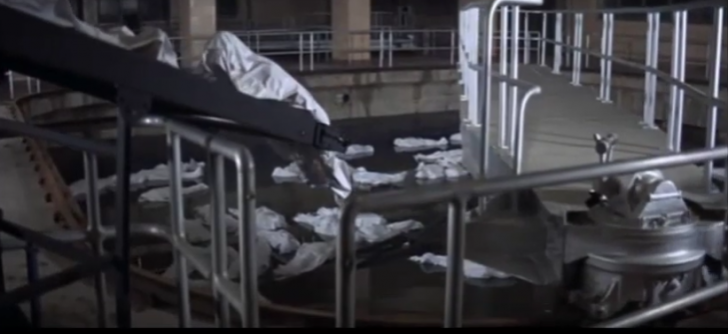The dawning of the Fifties birthed the Golden Age of science fiction cinema in America, lasting until…well, has it ever really ended? From the nuclear blast ground zero of giant mutant invasion sci-fi, every subsequent era has had its own impactful wave: the mind-expanding, body-introspective films of the Sixties; the socio-political-environmental Seventies; the Eighties, where the breakneck evolution of special effects sired block bluster-y, world-exploring epics; the technological fight for the human soul underscored the Nineties; and in the decades since, American science fiction, cued by a distinctly European treatment of the genre, has moved toward the more cerebral and irreverent, led by filmmakers like Christopher Nolan, Bong Joon-ho, and Alex Garland.
The 2020 Boston Sci-Fi Film Festival, transmogrifying minds at the Somerville Theatre from February 7th through the 17th, culminates in a twenty-four hour movie marathon that not only reflects the genre’s past personas and preoccupations, but establishes its own unifying theme of humanity’s ongoing grapple with fractured identity. Contemporary enough for you?

The marathon ignites under its inaugural showing, Ken Russell’s Altered States (1980); the film is most notable for its pre-steampunk clash of pseudo-academic cyberpunk principles and the Gothic analog aesthetic of Frankenstein’s world, and the cacophonous, dissonant score by John Corigliano. Starring a begoggled, peak-1980s and fully jawlined William Hurt (in his film debut) as an egotistical, proselyting Harvard scientist in search of his “true self” by any experimental, drug-inducing measures necessary, his Eddie Jessup transforms along the way into an ape man and a weird, larval stage mass of flesh via a deprivation tank straight out of BioShock. In the end, director Russell is more concerned with trippy visuals, while the story paints Jessup as little more than a self-absorbed jerk terrified that domesticity will destroy his animal primacy. Its climax reaches for some kind of 2001-like cosmic redemption and rebirth, but mostly it just sputters.
David Cronenberg’s 1986 remake of The Fly is Altered’s smarter, cooler cousin while treading similar terrain. Like Hurt’s character, Jeff Goldblum’s Seth Brundle wields his intellect almost as a seducing agent; instead of oozing white privilege pushiness, though, Goldblum’s awash in charisma, lending the film an empathetic tension absent from the former. And while Ken Russell saw his film as “a love story,” The Fly really is the story of the love that blooms between Brundle and journalist Veronica Quaife, played by Geena Davis in a dextrous, layered performance. It’s also about how smart women subsume parts of themselves in the quest to satiate and save the archetypal troubled male genius, who himself winds up literally—and in high Cronengore fashion—subsuming parts of other things, organic or otherwise. But the horror doesn’t truly set in until nearly halfway through, when Brundle and a stowaway fly fuse together in a teleportation pod mishap and begin to devolve; by then, the arc of the romance has been suffused with the genuine sorrow of a relationship on the brink of failure.
History has unfairly reduced Richard Fleischer’s Soylent Green (1973), the dystopian, climate change fever dream starring Charlton Heston, Edward G. Robinson, and Charlton Heston’s ascot, to a cinematic punchline (“Soylent Green is people!”). And while the film sometimes sits awkwardly in the space between better genre efforts—its production design an often unholy brew of the Dead End Kids and A Clockwork Beverly Hills—it’s nastier than most of the era’s warning-shot, environmental sci-fi, bolder in its showcasing of governmental malevolence and humanity’s penchant for fucking things up, and with a misanthropic Heston character mostly indifferent to concepts of grace. Soylent Green’s best landing punch reveals our complicity in systematic savagery and makes us pay with our own, actual flesh.
The marathon’s irradiated wind scatters sci-fi dust across a wide spectrum of other films, too, from 1965’s Die, Monster, Die (based on H.P.Lovecraft’s The Colour Out of Space, recently adapted again by Hardware filmmaker Richard Stanley and time-traveling vampire Nicolas Cage) to 1987’s irrepressible Spaceballs (whose creator Mel Brooks—secretly and stunningly—also co-produced Cronenberg’s Fly).
So, if amongst the many intergalactic plains of existence on display at the Boston Sci-Fi Film Festival you’re still unable to forge an identity—to find yourself—well, then, you may have already been replaced by a pod person.
